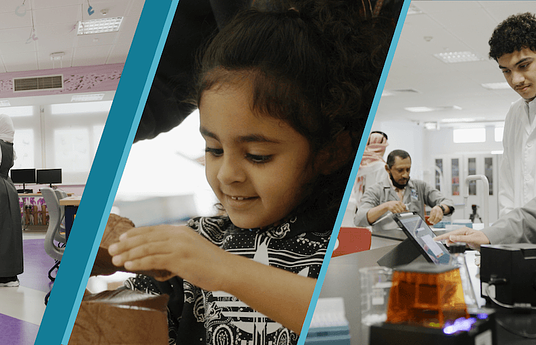Innovative solutions for the project were submitted from public, private, local, and international schools; museums, NGOs, communities and companies. In total 101 innovations were published for review, out of which 21 have been shortlisted for the final selection to be revealed in 2025.
What does education innovation look like in Qatar?
The majority of the submitted innovations focused on teaching STEM, general subjects, reading, and Arabic language and culture. The graphic below details themes within the learning environment, which ranged from student engagement to collaborative projects.
 Picture 1: Themes in the innovations’ learning environment. Themes in the submitted innovations’ learning environment are visually represented in the pie chart. The most prevalent themes were personalised learning (30.3%), student engagement (27.3%), joyful learning (21.2%), and project-based learning (12.1%). Support sessions (6.1%) and collaborative projects (3.0%) were also included.
Picture 1: Themes in the innovations’ learning environment. Themes in the submitted innovations’ learning environment are visually represented in the pie chart. The most prevalent themes were personalised learning (30.3%), student engagement (27.3%), joyful learning (21.2%), and project-based learning (12.1%). Support sessions (6.1%) and collaborative projects (3.0%) were also included.
“We were delighted to see a diverse array of innovative submissions, showcasing the creativity and resourcefulness of educators in our country. Many ideas were truly inspiring, demonstrating great potential for impact and scalability. Some innovations, while still in their early stages, showed promising potential, and others, though already well-established, offered a solid foundation to build upon with further focus on our criteria,” says Maryam Hassan Al Hajri, Director of Partnerships, PUE Strategic Initiatives and Partnership at Qatar Foundation.
While many of the innovations had no specific target group and could be used by students, teachers, parents or anyone in the learning ecosystem, students were still the primary target group of the solutions (for 63% of the innovations). Out of these, most were targeted at students in the upper and basic grades. The graphic below details the target groups of the innovations.

Picture 2: Target Groups for Innovations. The first pie chart illustrates the distribution of the primary target groups for the submitted innovations: students (63,3%, community 23,3% and teachers 13,3%. The second pie chart breaks down the student-focused innovations (63.3%) into more specific categories with most of the student-focused ones being targeted at students in the upper (21.9%) and basic grades (18.8%). Primary and lower grade students were the target of 21.9% of the innovations in total.
Shortlisted Innovations
The shortlisted educational innovations stand out for their focus on hands-on learning experiences, promoting student engagement, fostering critical thinking and problem-solving skills, and aligning with global innovations such as the United Nations Sustainable Development Goals (SDGs).
Some innovations concentrate on environmental awareness and action, empowering students to tackle issues like climate change and waste reduction through project-based learning. Others, utilise innovative approaches like transforming social media into educational platforms and fostering entrepreneurship among children from a young age.
Educational technology and utilising AI plays a significant role in several innovations. Additionally, innovations demonstrate efforts to make learning culturally relevant and inclusive.
The shortlisted innovations collectively showcase Qatar's commitment to fostering creative approaches to education and preparing students for future challenges while promoting values, cultural awareness, and community engagement.
Looking Back
The first quest to collect the most innovative and scalable innovations in Qatar began in 2021 when HundrED and Qatar Foundation launched their first Spotlight on Qatar. As a result of this project, 10 innovations were selected for the collection in 2023.
“We saw an increase in submissions (of almost 160%) this year compared to the last call a couple of years ago. We were also very happy to see people who submitted last time growing their innovations and/or submitting new ones to the 2025 collection,” says Ariana Gonchigdorj, Research Assistant at HundrED.
__________________________________
Spotlight on Qatar 2025 in a Nutshell
Achieving the ambitious goals laid out in Qatar’s national development agenda require innovative approaches and fresh ideas from a broad coalition of educators and educational leaders throughout the country and internationally. Through the Spotlight on Qatar 2025, HundrED and Qatar Foundation aim to identify 10-15 impactful and scalable education innovations that contribute to Qatar’s vision to provide progressive, first-rate education to its students. The project is an extension to the collaboration that began in 2021 when the first Spotlight on Qatar was launched resulting in the selection of the 10 most inspiring innovations in the country.
The next step in selecting 10-15 innovations for the collection of 2025 includes a rigorous review by a local advisory committee made up of educators, researchers, and community stakeholders who will score each innovation and help decide which ones will make the cut to be included in the actual Spotlight collection. The advisory review period is June 10 to June 21. The collection will be released in the beginning of 2025.


